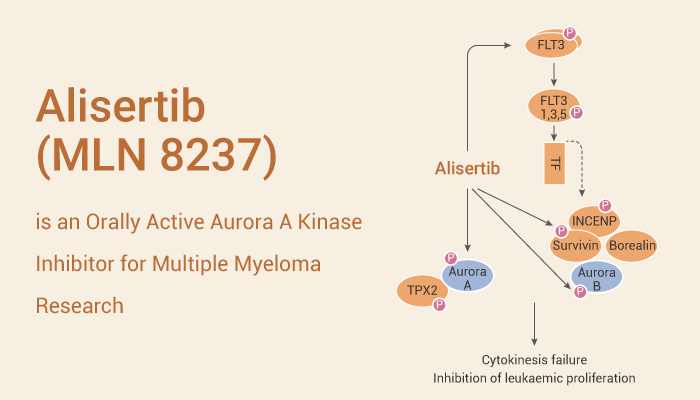Aurora kinases belong to serine/threonine kinases. Aurora kinases control multiple events during cell cycle progression and are essential for mitotic and meiotic bipolar spindle assembly and function. This family contains three members: Aurora A (AURKA), Aurora B (AURKB), and Aurora C (AURKC). AURKA, AURKB, and AURKC share a highly conserved kinase domain. AURKA mostly controls centrosome maturation and bipolar spindle assembly, while AURKB and AURKC are important in condensation, attachment to kinetochores, and alignment of chromosomes during (pro-)metaphase and cytokinesis. In human tumors, all Aurora kinase members play oncogenic roles related to their mitotic activity and promote cancer cell survival and proliferation.
AURKA belongs to the family of serine/threonine kinases, whose activation is necessary for cell division processes via regulation of mitosis. AURKA shows significantly higher expression in cancer tissues than in normal control tissues for multiple tumor types according to the TCGA database. Moreover, activation of AURKA has been demonstrated to play an important role in a wide range of cancers, and numerous AURKA substrates have been identified. AURKA-mediated phosphorylation can regulate the functions of AURKA substrates, some of which are mitosis regulators, tumor suppressors, or oncogenes. In addition, the enrichment of AURKA-interacting proteins with the KEGG pathway and GO analysis has demonstrated that these proteins are involved in classic oncogenic pathways.
Alisertib (MLN 8237) is an orally active and selective Aurora A kinase inhibitor.

Alisertib binds to Aurora A kinase resulting in mitotic spindle abnormalities, mitotic accumulation. Importantly, Alisertib induces apoptosis and autophagy through targeting the AKT/mTOR/AMPK/p38 pathway in leukemic cells. Therefore, Alisertib inhibits cell proliferation in different tumer cell lines. What’s more, Alisertib causes tumor growth inhibition in solid tumor xenograft models. Meanwhile, Alisertib significantly reduces tumor burden and increases overall survival in xenograft-murine model of human-multiple myeloma.
All in all, Alisertib is an orally active and selective Aurora A kinase inhibitor that has anti-tumor activity.
References:
[1] Du R, et, al. Mol Cancer. 2021 Jan 15;20(1):15.
[2] Görgün G, et, al. Blood. 2010 Jun 24;115(25):5202-13.